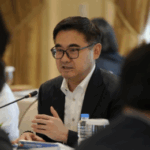MANILA – President Ferdinand R. Marcos Jr. has demonstrated “strong political will” in his continuous support to the ongoing modernization of the Armed Forces of the Philippines (AFP), a military spokesperson said Friday.
The spokesperson stated that Marcos’ commitment to the AFP modernization program “is both clear and consistent.”
“His administration has demonstrated strong political will in pushing for a credible defense posture by supporting capability upgrades, personnel development, and sustained funding for the AFP’s modernization goals,” the spokesperson added.
It was also noted that Marcos’ support to the military is an indication that the “Commander-in-Chief recognizes that a modern Armed Forces is essential to national security and regional stability.”
No specific details regarding the ongoing military upgrades and its processes were provided due to security reasons, but among the likely highlights of the AFP modernization this year is the signing of a USD700-million contract between the Department of National Defense (DND) and Korea Aerospace Industries, Ltd. (KAI) for the acquisition of 12 FA-50 Block 70 light combat aircraft.
Another spokesperson stated that Marcos has always “demonstrated firm and unwavering support” for the air service’s modernization.
During the Philippine Air Force’s 78th anniversary, the President stressed that the government will do everything it can to provide the service with the best equipment, training, and facilities.
This pledge reflects Marcos’ commitment to strengthening the Air Force’s capabilities in response to evolving security challenges.
“As Commander-in-Chief, he made it clear: the administration’s support is not only full — it is relentless and deeply rooted in trust, respect, and shared duty to the Filipino people,” the spokesperson said.
The AFP has repeatedly underscored the need to build a credible defense posture for the Philippine military amid territorial and maritime issues with China regarding the West Philippine Sea (WPS).
In dealing with the WPS situation, the AFP draws from Marcos’ leadership direction, which is “a balance of diplomacy and defense,” as they continue to fulfill their constitutional mandate with professionalism and unity.
Marcos has taken a “calibrated, strategic, and firm approach — anchored on international law, particularly the 2016 Arbitral Ruling and UNCLOS (United Nations Convention on the Law of the Sea)” in preserving Philippine sovereignty in the WPS.
“His actions reflect a balance of diplomacy and defense, guided by the paramount interest of protecting our territory and the welfare of our people,” the spokesperson said.
A naval official earlier stated that the AFP modernization program is aimed at bolstering the country’s defensive capabilities and not for offensive purposes.
“Just because we have our modernization program does not mean we have any intention to fight another country,” the official said.
Camp Aguinaldo
Camp Aguinaldo is a military base in Quezon City, Philippines, serving as the headquarters of the Armed Forces of the Philippines (AFP). Established in 1935 and named after the first Philippine President, Emilio Aguinaldo, it has played a key role in the country’s military history, including the 1986 People Power Revolution. Today, it remains a significant site for national defense and security operations.
Quezon City
Quezon City is a highly urbanized city in the Philippines, established in 1939 and named after Manuel L. Quezon, the country’s second president. It served as the national capital from 1948 to 1976 before Manila regained the title. Today, it is known for its vibrant culture, educational institutions, and landmarks like the Quezon Memorial Circle.
Armed Forces of the Philippines
The **Armed Forces of the Philippines (AFP)** is the military organization responsible for national defense and security, established on December 21, 1935, under the National Defense Act. It played key roles in World War II, counterinsurgency campaigns, and disaster response. Today, the AFP consists of the Army, Navy (including Marines), and Air Force, upholding sovereignty and supporting civil authorities.
West Philippine Sea
The West Philippine Sea refers to the eastern part of the South China Sea within the Philippines’ exclusive economic zone (EEZ), as officially declared by the Philippine government in 2012. Rich in marine biodiversity and natural resources, it has been a focal point of territorial disputes, particularly with China, which claims much of the region under its “Nine-Dash Line.” The Philippines has sought international arbitration, winning a landmark 2016 ruling at the Permanent Court of Arbitration, which rejected China’s claims and upheld Philippine sovereignty under the UN Convention on the Law of the Sea (UNCLOS).
United Nations Convention on the Law of the Sea
The **United Nations Convention on the Law of the Sea (UNCLOS)**, adopted in 1982, is an international treaty that establishes a legal framework for governing ocean resources, maritime boundaries, and marine environmental protection. It emerged from decades of negotiations to address territorial disputes, navigation rights, and seabed mining, becoming a cornerstone of international maritime law. UNCLOS has been ratified by over 160 countries, though some nations, including the U.S., have not fully joined the agreement.
Department of National Defense
The **Department of National Defense (DND)** is a government agency responsible for national security and military affairs in various countries, such as the Philippines, Canada, and others. Its history typically dates back to the country’s independence or the establishment of its modern defense system, overseeing armed forces, defense policies, and emergency preparedness. The DND plays a crucial role in maintaining sovereignty, disaster response, and international military cooperation.
Korea Aerospace Industries, Ltd.
Korea Aerospace Industries, Ltd. (KAI) is South Korea’s leading aerospace and defense company, established in 1999 through the merger of several domestic aerospace divisions. It specializes in aircraft manufacturing, including the T-50 supersonic trainer and the KF-21 Boramae fighter jet, playing a key role in advancing South Korea’s aerospace capabilities. KAI collaborates with global partners and supports both military and commercial aviation development.
Philippine Air Force
The **Philippine Air Force (PAF)** is the aerial warfare branch of the Armed Forces of the Philippines, established on **July 1, 1947**, after initially operating as the **Philippine Army Air Corps (PAAC)** during World War II. It plays a key role in national defense, disaster response, and territorial security, with historical involvement in conflicts such as World War II, the Korean War, and counterinsurgency operations. Today, the PAF continues to modernize its fleet and uphold its mission to protect Philippine airspace and support civil authorities.






